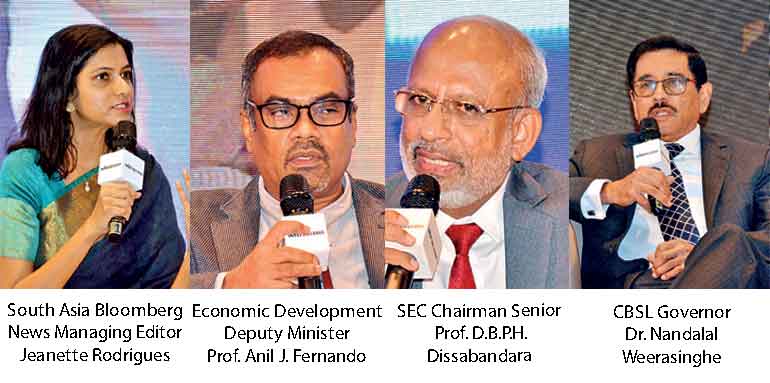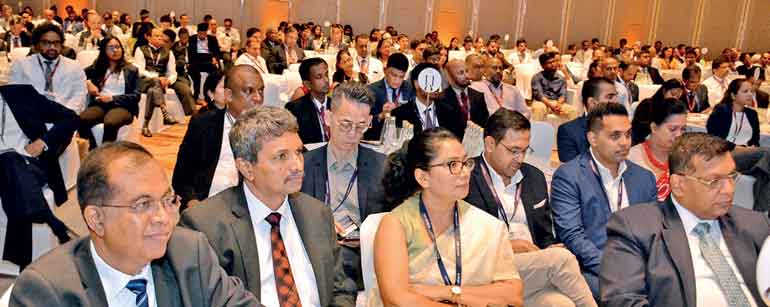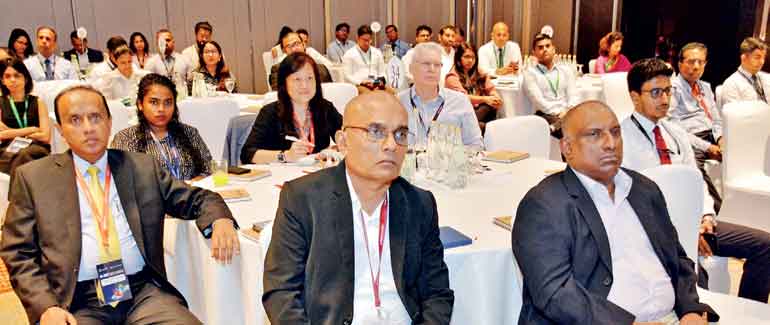Monday Feb 16, 2026
Monday Feb 16, 2026
Tuesday, 1 April 2025 02:42 - - {{hitsCtrl.values.hits}}

By Janani Kandaramage
As Sri Lanka seeks to attract greater foreign investment to drive economic recovery, the Government’s economic policy framework faced intense scrutiny at a panel discussion last week.
Amid improving credit ratings, a rebounding rupee, and rising investor confidence – panellists emphasised transparency, capital formation, and market efficiency as the building blocks of sustainable growth.
At the Capital Market Investor Forum jointly organised by the Colombo Stock Exchange (CSE) and Securities and Exchange Commission (SEC), the panel was moderated by South Asia Bloomberg News Managing Editor Jeanette Rodrigues. Speakers included Economic Development Sri Lanka Deputy Minister Prof. Anil J. Fernando, SEC Sri Lanka Chairman Senior Prof. D.B.P.H. Dissabandara, and CBSL Governor Dr. Nandalal Weerasinghe. Prof. Fernando proposed a strategy centred on economic stabilisation, capital market development, and financial transparency to bridge the savings-investment gap.
“Our primary focus has been on economic stabilisation, which requires strong leadership and coordination among public officials, agencies, and policymakers,” he said, adding that, “One of our key achievements has been fostering convergence—aligning the efforts of politicians, businesses, and public authorities. Often, governance faces challenges due to differing opinions, but we are witnessing greater unity in our economic recovery efforts. This convergence is essential for creating a stable environment where businesses can thrive, and investments can grow.”

He also said capital markets play a vital role in channelling savings into productive investments through various financial products, calling for strengthened capital markets as a means of bridging the gap between savings and investment.
In response to concerns about information transparency, Fernando discussed the need to leverage advancement in technology and financial infrastructure to challenge information asymmetry and enhance market efficiency.
He added: “If crucial market information remains concentrated in the hands of a few, it creates unfair advantages. To ensure a healthy and transparent capital market, information should be freely available to all investors. How do we do this? By making them freely available via technological platforms such as databases.”
He argued this step will strengthen market decisions by basing them on futuristic analyses rather than speculative advantages.
Reiterating Prof. Fernando’s sentiments on transparency, the SEC Chairman pointed out concrete steps undertaken by the present administration
He said: “The Government is actively introducing numerous legal amendments and new acts to strengthen transparency and governance. In addition to the laws discussed in previous presentations, the Proceeds of Crime Act has been presented in Parliament and is scheduled for debate on 8 April.”
He noted the Government’s commitment to good governance through the implementation of reforms including, close collaboration on anti-money laundering initiatives and strengthened financial oversight.
“Even in the absence of direct requests from agencies or authorities, the Government proactively takes steps to establish transparency and hold itself accountable. This proactive approach ensures a clear and responsible legal framework, reinforcing public trust, and preventing financial crimes by leveraging technology,” he remarked.

Beyond accountability mechanisms, Dr. Weerasinghe dissected the role of local monetary policy in ensuring long-term economic sustaina He acknowledged the country’s steady progress towards political stability this year, noting the potential for achieving a current account surplus. Historically, the nation has faced challenges with twin deficits: elevated fiscal deficits and substantial government debt, both of which have adversely affected the economy. Nevertheless, he believes through continued fiscal consolidation and the adoption of prudent policies, economic stability can be attained.
Although concerns were raised over budget constraints, Prof. Fernando assured that coordination between monetary and fiscal policy was key to avoiding contradictions.
He asserted: “Managing budget constraints in monetary and fiscal policy requires balancing economic growth, inflation control, and debt sustainability. Fiscal policy must allocate spending efficiently while managing deficits through taxation and responsible borrowing.”
- Pix by Upul Abayasekara